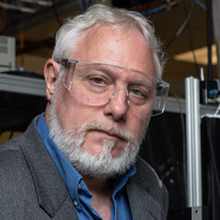Thomas Orlando
Contact Information
- orlando@chemistry.gatech.edu
- Phone
- (404) 894-4012
- Fax
- (404) 385-6057
- Location
- MoSE G209C
- Research Group
- Orlando Group

Thomas Orlando
Regents’ Professor
Awards
Fellow of the American Physical Society
Fellow of the American Association for the Advancement of Science
Associate Editor, Journal of Geophysical Research-Planets, NATO Collaborative Research Fellowship and Visiting Professor CNR/University of Rome, La Sapienza 1997-2000
NIH Young Investigator Award; 1998.
Education
B.S. Southampton College; Ph.D., State University of New York-Stony Brook; Postdoctoral, Asociated Western Universities, Postdoctoral Fellow, Solid State Sciences Division, Sandia National Labs, Albuquerque, NM; Institut fur Physikalische Chemie, Universi
Research
Electron- and Photon-stimulated Interface and Surface Processes. Dr. Orlando's group utilizes state-of-the-art ultra-high vacuum (UHV) surface science systems equipped with UV-laser sources and low-energy electron beams to stimulate reactions (such as the production of hydrogen) on a variety of substrates and interfaces. Sensitive laser detection schemes (resonance-enhanced multiphoton ionization) are used to probe the reaction dynamics. Approaches based on quantum mechanical interference to control desorption and patterning of surfaces at the nano- and meso-scale are also being developed.
Environmental Chemistry and Planetary Surface Science. Water is ubiquitous in terrestrial and planetary atmospheres and environments. Dr. Orlando's group studies "wet" interfaces using nanoscale films of ice grown in UHV. Radical and ion-molecule reactions are then initiated using electron- and photon-beam sources. These experiments are relevant to understanding the photochemistry of stratospheric cloud particles and magnetospheric processing of icy satellite surfaces in the Jovian system.
Biophysical Chemistry. The mechanisms of DNA damage and repair have been studied extensively, though the role intrinsic waters of hydration play in initiating damage have not been elucidated. Dr. Orlando's group will carry out electron- and photon-irradiation studies of DNA:water interfaces to examine the importance of direct vs. indirect damage.